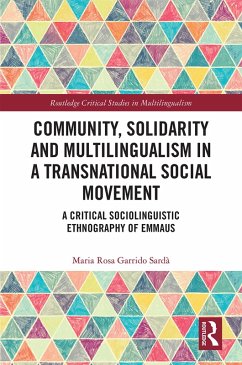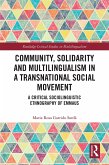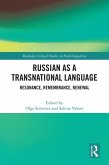Maria Rosa Garrido Sardà
Community, Solidarity and Multilingualism in a Transnational Social Movement (eBook, ePUB)
A Critical Sociolinguistic Ethnography of Emmaus
44,95 €
44,95 €
inkl. MwSt.
Sofort per Download lieferbar

22 °P sammeln
44,95 €
Als Download kaufen

44,95 €
inkl. MwSt.
Sofort per Download lieferbar

22 °P sammeln
Jetzt verschenken
Alle Infos zum eBook verschenken
44,95 €
inkl. MwSt.
Sofort per Download lieferbar
Alle Infos zum eBook verschenken

22 °P sammeln
Maria Rosa Garrido Sardà
Community, Solidarity and Multilingualism in a Transnational Social Movement (eBook, ePUB)
A Critical Sociolinguistic Ethnography of Emmaus
- Format: ePub
- Merkliste
- Auf die Merkliste
- Bewerten Bewerten
- Teilen
- Produkt teilen
- Produkterinnerung
- Produkterinnerung

Bitte loggen Sie sich zunächst in Ihr Kundenkonto ein oder registrieren Sie sich bei
bücher.de, um das eBook-Abo tolino select nutzen zu können.
Hier können Sie sich einloggen
Hier können Sie sich einloggen
Sie sind bereits eingeloggt. Klicken Sie auf 2. tolino select Abo, um fortzufahren.

Bitte loggen Sie sich zunächst in Ihr Kundenkonto ein oder registrieren Sie sich bei bücher.de, um das eBook-Abo tolino select nutzen zu können.
This book presents a critical sociolinguistic ethnography of the Emmaus movement, analyzing linguistic and discursive practices in two local communities to provide insight into solidarity discourses and transnational communication more broadly.
- Geräte: eReader
- mit Kopierschutz
- eBook Hilfe
Andere Kunden interessierten sich auch für
![Community, Solidarity and Multilingualism in a Transnational Social Movement (eBook, PDF) Community, Solidarity and Multilingualism in a Transnational Social Movement (eBook, PDF)]() Maria Rosa Garrido SardàCommunity, Solidarity and Multilingualism in a Transnational Social Movement (eBook, PDF)44,95 €
Maria Rosa Garrido SardàCommunity, Solidarity and Multilingualism in a Transnational Social Movement (eBook, PDF)44,95 €![Russian as a Transnational Language (eBook, ePUB) Russian as a Transnational Language (eBook, ePUB)]() Russian as a Transnational Language (eBook, ePUB)42,95 €
Russian as a Transnational Language (eBook, ePUB)42,95 €![Korean as a Heritage Language from Transnational and Translanguaging Perspectives (eBook, ePUB) Korean as a Heritage Language from Transnational and Translanguaging Perspectives (eBook, ePUB)]() Korean as a Heritage Language from Transnational and Translanguaging Perspectives (eBook, ePUB)42,95 €
Korean as a Heritage Language from Transnational and Translanguaging Perspectives (eBook, ePUB)42,95 €![Transnational Approaches to Bilingual and Second Language Teacher Education (eBook, ePUB) Transnational Approaches to Bilingual and Second Language Teacher Education (eBook, ePUB)]() Transnational Approaches to Bilingual and Second Language Teacher Education (eBook, ePUB)42,95 €
Transnational Approaches to Bilingual and Second Language Teacher Education (eBook, ePUB)42,95 €![Translingual Identities and Transnational Realities in the U.S. College Classroom (eBook, ePUB) Translingual Identities and Transnational Realities in the U.S. College Classroom (eBook, ePUB)]() Heather RobinsonTranslingual Identities and Transnational Realities in the U.S. College Classroom (eBook, ePUB)39,95 €
Heather RobinsonTranslingual Identities and Transnational Realities in the U.S. College Classroom (eBook, ePUB)39,95 €![Transnational Literacy Autobiographies as Translingual Writing (eBook, ePUB) Transnational Literacy Autobiographies as Translingual Writing (eBook, ePUB)]() Suresh CanagarajahTransnational Literacy Autobiographies as Translingual Writing (eBook, ePUB)44,95 €
Suresh CanagarajahTransnational Literacy Autobiographies as Translingual Writing (eBook, ePUB)44,95 €![Migration, Adult Language Learning and Multilingualism (eBook, ePUB) Migration, Adult Language Learning and Multilingualism (eBook, ePUB)]() Anna-Elisabeth HolmMigration, Adult Language Learning and Multilingualism (eBook, ePUB)42,95 €
Anna-Elisabeth HolmMigration, Adult Language Learning and Multilingualism (eBook, ePUB)42,95 €-
-
-
This book presents a critical sociolinguistic ethnography of the Emmaus movement, analyzing linguistic and discursive practices in two local communities to provide insight into solidarity discourses and transnational communication more broadly.
Dieser Download kann aus rechtlichen Gründen nur mit Rechnungsadresse in A, B, BG, CY, CZ, D, DK, EW, E, FIN, F, GR, HR, H, IRL, I, LT, L, LR, M, NL, PL, P, R, S, SLO, SK ausgeliefert werden.
Produktdetails
- Produktdetails
- Verlag: Taylor & Francis eBooks
- Seitenzahl: 236
- Erscheinungstermin: 1. September 2020
- Englisch
- ISBN-13: 9780429631849
- Artikelnr.: 59826559
- Verlag: Taylor & Francis eBooks
- Seitenzahl: 236
- Erscheinungstermin: 1. September 2020
- Englisch
- ISBN-13: 9780429631849
- Artikelnr.: 59826559
- Herstellerkennzeichnung Die Herstellerinformationen sind derzeit nicht verfügbar.
Maria Rosa Garrido Sardà is Lecturer in English Linguistics at the University of Lausanne, Switzerland
Contents
List of Figures
Acknowledgements
Chapter 1: Language, discourse and transnationalism in a social movement xx
Emmaus as a holistic social movement xx
Investigating sociolinguistic articulation across borders xx
Theoretical approaches xx
Critical ethnographic sociolinguistics xx
Transnational social movements xx
Community as a nexus xx
An ethnographic journey into a transnational field xx
Access, collaboration and positioning xx
An ethnographic toolbox xx
Structure of the book xx
Chapter 2: Historicising the transnational expansion of a social movement
through key events and texts xx
Introduction xx
Transnational and multilingual expansion of a French movement xx
Foundation and "Catacombs period" (1949-1954) xx
"Insurrection of Goodness" in France (1954) and early expansion (1955-1969)
xx
From the First World Assembly (1969) to the politicisation of the movement
(1988) xx
Historicising religion and politics in two different Emmaus communities xx
Faith traditions and socio-political activism xx
Emmaus Barcelona: Progressive Catholicism and post-'68 activism xx
Emmaus London: Charity and social enterprise xx
Concluding remarks: A solidarity mission over time xx
Chapter 3: Transnational articulation and socialisation through the Emmaus
founding story xx
Introduction: A social movement tells a "new story" xx
Conceptual framework: Collective identity through narrative chronotopes xx
"A story of us": A chronotopic analysis of the Emmaus origin story xx
An ethnographic analysis of the movement's founding story in situated
interactions xx
Socialisation into "stories of us": Oral storytelling and semiotic
artefacts xx
"Stories of self": Personal narratives of transformation xx
Concluding remarks: Creating sameness in the Emmaus social movement xx
Chapter 4: Discursive localisations of solidarity in two socio-political
contexts xx
Introduction xx
"Towards other reasons to live": Alter-globalisation discourses in Emmaus
Barcelona xx
Snapshot: "Stories of now" in socio-political activism xx
Zooming in: A residential project for migrants xx
"Emmaus, the homeless charity that works": Discourses of reciprocity and
skilling in the UK xx
Snapshot: "Stories of now" in homeless activation xx
Zooming in: Voluntary work schemes for the homeless xx
Concluding remarks: Solidarity at the intersection of transnational trends,
nation-state regimes and individual trajectories xx
Chapter 5: Language ideologies for negotiating positioning in the Emmaus
social movement xx
Introduction xx
Two distinct visions of Emmaus as a movement xx
Emmaus as a "multi-national of the heart" xx
Emmaus as a rhizomatic network xx
Constructing positioning in Emmaus through language ideologies of lingua
francas xx
Deproblematising language: French and Spanish as lingua francas in a
Catalan community xx
Problematising language: Tensions between English and French in a recent
English community xx
Concluding remarks: Ideologies of multilingualism and positioning in the
movement xx
Chapter 6: Linguistic nationalism and the erasure of multilingualism in
local Emmaus communities xx
Constructing language: Between fixity and fluidity in localities xx
Fitting into (linguistic) nationalism xx
Emmaus London: Constructing a monolingual space in an English charity xx
Emmaus Barcelona: Tensions between monolingual and bilingual norms xx
Backgrounding multilingualism in everyday practices xx
Emmaus London: Institutional erasure of multilingual biographies xx
Emmaus Barcelona: Multilingualism and new migrants xx
Concluding remarks: Nationalist ideologies in a transnational social
movement xx
Chapter 7: Language, transnational solidarity and utopia in an imagined
community xx
Emmaus as a utopia made of "walking words" xx
What's the (hi)story? Key findings about Emmaus as a social movement xx
Towards a sociolinguistics of transnationalism xx
What now? The story continues xx
Appendix 1: Universal Manifesto of the Emmaus movement (1969)
Appendix 2: Abbé Pierre's Radio Appeal on 1st February 1954 (short version)
Appendix 3: Orientations - Propositions - Questions adopted at the 6th
Emmaus International General Assembly in Verona (1988)
Appendix 4: Transcription conventions
References
Index
List of Figures
Acknowledgements
Chapter 1: Language, discourse and transnationalism in a social movement xx
Emmaus as a holistic social movement xx
Investigating sociolinguistic articulation across borders xx
Theoretical approaches xx
Critical ethnographic sociolinguistics xx
Transnational social movements xx
Community as a nexus xx
An ethnographic journey into a transnational field xx
Access, collaboration and positioning xx
An ethnographic toolbox xx
Structure of the book xx
Chapter 2: Historicising the transnational expansion of a social movement
through key events and texts xx
Introduction xx
Transnational and multilingual expansion of a French movement xx
Foundation and "Catacombs period" (1949-1954) xx
"Insurrection of Goodness" in France (1954) and early expansion (1955-1969)
xx
From the First World Assembly (1969) to the politicisation of the movement
(1988) xx
Historicising religion and politics in two different Emmaus communities xx
Faith traditions and socio-political activism xx
Emmaus Barcelona: Progressive Catholicism and post-'68 activism xx
Emmaus London: Charity and social enterprise xx
Concluding remarks: A solidarity mission over time xx
Chapter 3: Transnational articulation and socialisation through the Emmaus
founding story xx
Introduction: A social movement tells a "new story" xx
Conceptual framework: Collective identity through narrative chronotopes xx
"A story of us": A chronotopic analysis of the Emmaus origin story xx
An ethnographic analysis of the movement's founding story in situated
interactions xx
Socialisation into "stories of us": Oral storytelling and semiotic
artefacts xx
"Stories of self": Personal narratives of transformation xx
Concluding remarks: Creating sameness in the Emmaus social movement xx
Chapter 4: Discursive localisations of solidarity in two socio-political
contexts xx
Introduction xx
"Towards other reasons to live": Alter-globalisation discourses in Emmaus
Barcelona xx
Snapshot: "Stories of now" in socio-political activism xx
Zooming in: A residential project for migrants xx
"Emmaus, the homeless charity that works": Discourses of reciprocity and
skilling in the UK xx
Snapshot: "Stories of now" in homeless activation xx
Zooming in: Voluntary work schemes for the homeless xx
Concluding remarks: Solidarity at the intersection of transnational trends,
nation-state regimes and individual trajectories xx
Chapter 5: Language ideologies for negotiating positioning in the Emmaus
social movement xx
Introduction xx
Two distinct visions of Emmaus as a movement xx
Emmaus as a "multi-national of the heart" xx
Emmaus as a rhizomatic network xx
Constructing positioning in Emmaus through language ideologies of lingua
francas xx
Deproblematising language: French and Spanish as lingua francas in a
Catalan community xx
Problematising language: Tensions between English and French in a recent
English community xx
Concluding remarks: Ideologies of multilingualism and positioning in the
movement xx
Chapter 6: Linguistic nationalism and the erasure of multilingualism in
local Emmaus communities xx
Constructing language: Between fixity and fluidity in localities xx
Fitting into (linguistic) nationalism xx
Emmaus London: Constructing a monolingual space in an English charity xx
Emmaus Barcelona: Tensions between monolingual and bilingual norms xx
Backgrounding multilingualism in everyday practices xx
Emmaus London: Institutional erasure of multilingual biographies xx
Emmaus Barcelona: Multilingualism and new migrants xx
Concluding remarks: Nationalist ideologies in a transnational social
movement xx
Chapter 7: Language, transnational solidarity and utopia in an imagined
community xx
Emmaus as a utopia made of "walking words" xx
What's the (hi)story? Key findings about Emmaus as a social movement xx
Towards a sociolinguistics of transnationalism xx
What now? The story continues xx
Appendix 1: Universal Manifesto of the Emmaus movement (1969)
Appendix 2: Abbé Pierre's Radio Appeal on 1st February 1954 (short version)
Appendix 3: Orientations - Propositions - Questions adopted at the 6th
Emmaus International General Assembly in Verona (1988)
Appendix 4: Transcription conventions
References
Index
Contents
List of Figures
Acknowledgements
Chapter 1: Language, discourse and transnationalism in a social movement xx
Emmaus as a holistic social movement xx
Investigating sociolinguistic articulation across borders xx
Theoretical approaches xx
Critical ethnographic sociolinguistics xx
Transnational social movements xx
Community as a nexus xx
An ethnographic journey into a transnational field xx
Access, collaboration and positioning xx
An ethnographic toolbox xx
Structure of the book xx
Chapter 2: Historicising the transnational expansion of a social movement
through key events and texts xx
Introduction xx
Transnational and multilingual expansion of a French movement xx
Foundation and "Catacombs period" (1949-1954) xx
"Insurrection of Goodness" in France (1954) and early expansion (1955-1969)
xx
From the First World Assembly (1969) to the politicisation of the movement
(1988) xx
Historicising religion and politics in two different Emmaus communities xx
Faith traditions and socio-political activism xx
Emmaus Barcelona: Progressive Catholicism and post-'68 activism xx
Emmaus London: Charity and social enterprise xx
Concluding remarks: A solidarity mission over time xx
Chapter 3: Transnational articulation and socialisation through the Emmaus
founding story xx
Introduction: A social movement tells a "new story" xx
Conceptual framework: Collective identity through narrative chronotopes xx
"A story of us": A chronotopic analysis of the Emmaus origin story xx
An ethnographic analysis of the movement's founding story in situated
interactions xx
Socialisation into "stories of us": Oral storytelling and semiotic
artefacts xx
"Stories of self": Personal narratives of transformation xx
Concluding remarks: Creating sameness in the Emmaus social movement xx
Chapter 4: Discursive localisations of solidarity in two socio-political
contexts xx
Introduction xx
"Towards other reasons to live": Alter-globalisation discourses in Emmaus
Barcelona xx
Snapshot: "Stories of now" in socio-political activism xx
Zooming in: A residential project for migrants xx
"Emmaus, the homeless charity that works": Discourses of reciprocity and
skilling in the UK xx
Snapshot: "Stories of now" in homeless activation xx
Zooming in: Voluntary work schemes for the homeless xx
Concluding remarks: Solidarity at the intersection of transnational trends,
nation-state regimes and individual trajectories xx
Chapter 5: Language ideologies for negotiating positioning in the Emmaus
social movement xx
Introduction xx
Two distinct visions of Emmaus as a movement xx
Emmaus as a "multi-national of the heart" xx
Emmaus as a rhizomatic network xx
Constructing positioning in Emmaus through language ideologies of lingua
francas xx
Deproblematising language: French and Spanish as lingua francas in a
Catalan community xx
Problematising language: Tensions between English and French in a recent
English community xx
Concluding remarks: Ideologies of multilingualism and positioning in the
movement xx
Chapter 6: Linguistic nationalism and the erasure of multilingualism in
local Emmaus communities xx
Constructing language: Between fixity and fluidity in localities xx
Fitting into (linguistic) nationalism xx
Emmaus London: Constructing a monolingual space in an English charity xx
Emmaus Barcelona: Tensions between monolingual and bilingual norms xx
Backgrounding multilingualism in everyday practices xx
Emmaus London: Institutional erasure of multilingual biographies xx
Emmaus Barcelona: Multilingualism and new migrants xx
Concluding remarks: Nationalist ideologies in a transnational social
movement xx
Chapter 7: Language, transnational solidarity and utopia in an imagined
community xx
Emmaus as a utopia made of "walking words" xx
What's the (hi)story? Key findings about Emmaus as a social movement xx
Towards a sociolinguistics of transnationalism xx
What now? The story continues xx
Appendix 1: Universal Manifesto of the Emmaus movement (1969)
Appendix 2: Abbé Pierre's Radio Appeal on 1st February 1954 (short version)
Appendix 3: Orientations - Propositions - Questions adopted at the 6th
Emmaus International General Assembly in Verona (1988)
Appendix 4: Transcription conventions
References
Index
List of Figures
Acknowledgements
Chapter 1: Language, discourse and transnationalism in a social movement xx
Emmaus as a holistic social movement xx
Investigating sociolinguistic articulation across borders xx
Theoretical approaches xx
Critical ethnographic sociolinguistics xx
Transnational social movements xx
Community as a nexus xx
An ethnographic journey into a transnational field xx
Access, collaboration and positioning xx
An ethnographic toolbox xx
Structure of the book xx
Chapter 2: Historicising the transnational expansion of a social movement
through key events and texts xx
Introduction xx
Transnational and multilingual expansion of a French movement xx
Foundation and "Catacombs period" (1949-1954) xx
"Insurrection of Goodness" in France (1954) and early expansion (1955-1969)
xx
From the First World Assembly (1969) to the politicisation of the movement
(1988) xx
Historicising religion and politics in two different Emmaus communities xx
Faith traditions and socio-political activism xx
Emmaus Barcelona: Progressive Catholicism and post-'68 activism xx
Emmaus London: Charity and social enterprise xx
Concluding remarks: A solidarity mission over time xx
Chapter 3: Transnational articulation and socialisation through the Emmaus
founding story xx
Introduction: A social movement tells a "new story" xx
Conceptual framework: Collective identity through narrative chronotopes xx
"A story of us": A chronotopic analysis of the Emmaus origin story xx
An ethnographic analysis of the movement's founding story in situated
interactions xx
Socialisation into "stories of us": Oral storytelling and semiotic
artefacts xx
"Stories of self": Personal narratives of transformation xx
Concluding remarks: Creating sameness in the Emmaus social movement xx
Chapter 4: Discursive localisations of solidarity in two socio-political
contexts xx
Introduction xx
"Towards other reasons to live": Alter-globalisation discourses in Emmaus
Barcelona xx
Snapshot: "Stories of now" in socio-political activism xx
Zooming in: A residential project for migrants xx
"Emmaus, the homeless charity that works": Discourses of reciprocity and
skilling in the UK xx
Snapshot: "Stories of now" in homeless activation xx
Zooming in: Voluntary work schemes for the homeless xx
Concluding remarks: Solidarity at the intersection of transnational trends,
nation-state regimes and individual trajectories xx
Chapter 5: Language ideologies for negotiating positioning in the Emmaus
social movement xx
Introduction xx
Two distinct visions of Emmaus as a movement xx
Emmaus as a "multi-national of the heart" xx
Emmaus as a rhizomatic network xx
Constructing positioning in Emmaus through language ideologies of lingua
francas xx
Deproblematising language: French and Spanish as lingua francas in a
Catalan community xx
Problematising language: Tensions between English and French in a recent
English community xx
Concluding remarks: Ideologies of multilingualism and positioning in the
movement xx
Chapter 6: Linguistic nationalism and the erasure of multilingualism in
local Emmaus communities xx
Constructing language: Between fixity and fluidity in localities xx
Fitting into (linguistic) nationalism xx
Emmaus London: Constructing a monolingual space in an English charity xx
Emmaus Barcelona: Tensions between monolingual and bilingual norms xx
Backgrounding multilingualism in everyday practices xx
Emmaus London: Institutional erasure of multilingual biographies xx
Emmaus Barcelona: Multilingualism and new migrants xx
Concluding remarks: Nationalist ideologies in a transnational social
movement xx
Chapter 7: Language, transnational solidarity and utopia in an imagined
community xx
Emmaus as a utopia made of "walking words" xx
What's the (hi)story? Key findings about Emmaus as a social movement xx
Towards a sociolinguistics of transnationalism xx
What now? The story continues xx
Appendix 1: Universal Manifesto of the Emmaus movement (1969)
Appendix 2: Abbé Pierre's Radio Appeal on 1st February 1954 (short version)
Appendix 3: Orientations - Propositions - Questions adopted at the 6th
Emmaus International General Assembly in Verona (1988)
Appendix 4: Transcription conventions
References
Index







